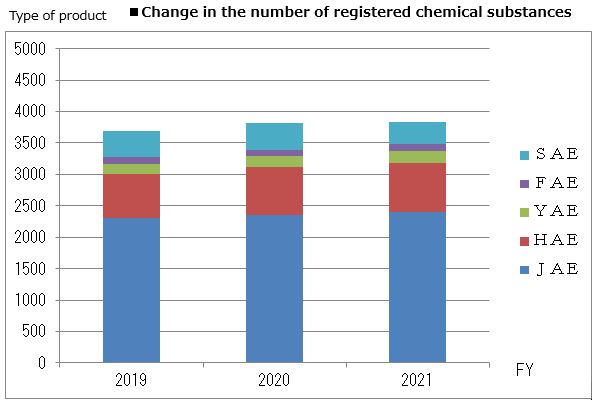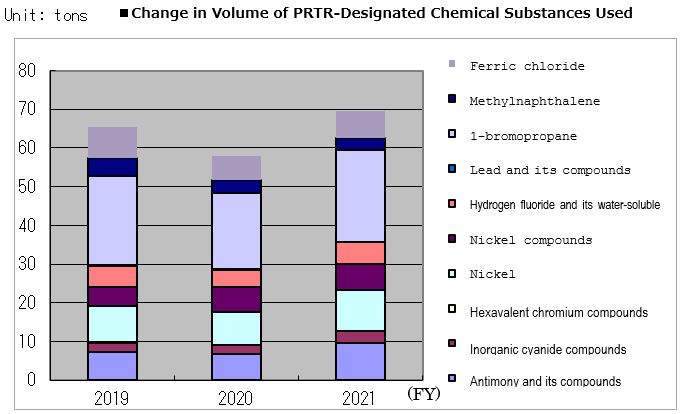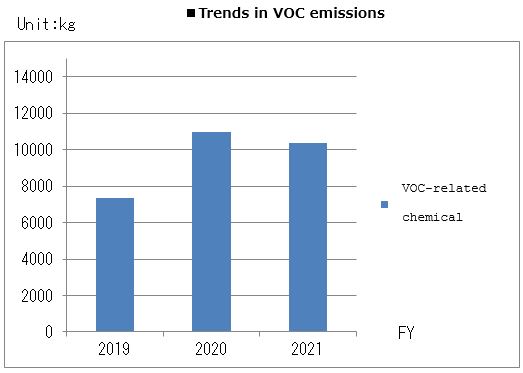Environmental Report 2022
Chemical Substance Management
Improving Chemical Substance Management
In consideration of workers’ safety and health, and looking to lower environmental impact, we are working to improve the management of chemical substances. We will present examples of our initiatives.Reduction of Chemical Substances
Monitoring Registration of Chemical Substance Product TypesChange in the number of chemical substance product types at production sites in Japan is as visualized in the below graph. The reason that the JAE site has more chemical substances than other production sites is because it is not only involved in production but is also a development plant and uses chemical substances for testing. The JAE Group monitors whether unnecessary chemical substances have been registered so that the number registered does not increase any further. The Group will move aggressively to reduce the volume of chemical substances used, as shown below.
Reduction of Use of Chemical Substances
In fiscal 2021, we continued as in the previous year to conduct our activities with the goal of reducing the amount of chemical substances used by selecting designated substances for each domestic production base in order to reduce our environmental impact. The main chemical substance reduction activities for fiscal 2021 are listed below, and we will continue to work to reduce chemical substance use.
- JAE:
- Reduced the amount of deposited gold needed for gold plating
Reduced registered substances by rationalizing production, and reduced substitutes and organic solvents
- HAE:
- Reduction of hypochlorous and bisulfite by reviewing the cleaning frequency of plating vats
Reduction of IPA usage by reviewing processing equipment operation
Reductions to chemicals used for trivalent chromium waste disposal
- YAE:
- Reduction of part cleaner purchases
- SAE:
- Reductions in processed cooling tower water by introducing water processing equipment
PRTR Data
The graph below shows the change in the amount of chemical substances (see note) subject to the PRTR Law (*use cursor to view definitions) handled at production sites in Japan.Regarding PRTR substances, the amount of 1-bromopropane used as a cleaning agent by JAE and SAE has increased due to higher production. We will continue to limit the amount used by using remanufactured products (recycling) and reusing agents more than once (reuse) by installing solvent recycling equipment and reviewing the frequency of treatment solution replacement.
Note: Antimony and its compounds, inorganic cyanide compounds, hexavalent chromium compounds, toluene, nickel, nickel compounds, hydrogen fluoride and its water-soluble salts, lead, 1-bromopropane, methylnaphthalene, and ferric chloride.
VOC Information
The total volume of chemical emissions of VOCs (use cursor to view definition) and related substances for production sites in Japan is shown in the graph below. Atmospheric emissions of methanol, which is used as a cleaning agent, and ethanol have largely decreased, and atmospheric emissions have declined overall as a result. In order to curb the amount of atmospheric emissions, the Group is considering reduction measures such as installing dampers within the equipment so that excess VOCs are not released into the atmosphere when the equipment stops. In addition, we are improving the airtightness of containers and adjusting the amount handled.Embracing Sustainability Management
Significance of the 2022 Environmental Report
Symbol of the Group's Environmental Policies
Scope of Reporting and Editorial Policy
Policies and Results of Environmental Activities
Environmental Management
- Implementation Status of the Environmental Management System
- Environmental Audits
- Environmental Education
- Environmental Risk Management
- Environmental Accounting
Engaging with Society
- Involvement with Biodiversity
- Supply Chain Management
- Eco-friendly Products
- Social Contribution Activities
- Environmental Activity History
Initiatives to Reduce Environmental Impact


